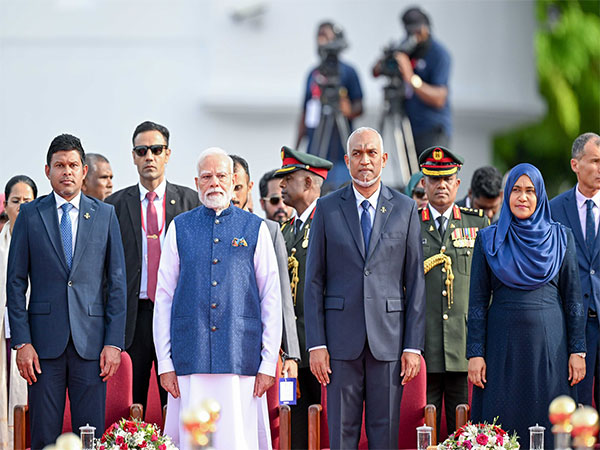On July 26 Indian Prime Minister Narendra Modi was the guest of honour in Male for the celebration of the 60th anniversary of independence of the Maldives. On his arrival at the island a day before, he was accorded a 21-gun salute. The participation of China in the event was restricted to a congratulatory greeting from Chinese President Xi Jinping to the Maldives President Mohammed Muizzu.
It was a sea change in the scenario from the days of the ‘India Out’ campaign in the Maldives in late 2023 when Male was drifting closer to Beijing. Clearly, India has regained much of its lost position in this strategic group of islands which have been on the ancient trade routes from Arab countries and now a gateway to the Indian Ocean region.
On the contrary, the Chinese influence has waned.
President Muizzu in April 2024 used an anti-India plank to win the parliamentary election and had also taken decisions that had strained ties with New Delhi. He had placed all agreements signed with India by the previous Ibrahim Mohamed Solih government under review and had asked India to replace all its military personnel in the Maldives with civilian staff.
Muizzu had also tilted heavily towards China, prompting the opposition Maldives Democratic Party to question his policy of taking an anti-India stance and pushing the island towards Beijing. In the poll campaign, he had promised to build thousands of apartments, reclaim land for urban development and upgrade airports; all with funds from China.
This has been an old tactic of politicians in the Maldives to come to power. Even in 2013, the Abdulla Yameen government came to power using an anti-India and pro-China plank. The ‘India Out’ campaign that had been launched before the elections was anchored on two helicopters that India gifted to Maldives in 2009 for humanitarian missions like medical evacuation.
At that time, the two sides also signed a defence cooperation agreement for joint surveillance and patrols in the Indian Ocean. Later, a Dornier aircraft was also lent to Maldives by India and unarmed Indian military personnel were stationed in the island to operate these. According to Male, there were 76 of them.
This, and the plan to set up a network of 26 radars, was used by the opposition both in 2013 and in 2023 to level the charge that Male was compromising its sovereignty and allowing Indian influence and presence in the island state to grow.
Taking advantage of this situation, China stepped in the Maldives with its Belt and Road Initiative in 2014. Some islands in the archipelago and infrastructure projects were leased to China, a Free Trade Agreement was signed between Beijing and Male and an ocean observation station was sought to be set up; an euphemism for a Chinese listening post in the Indian Ocean. The listening post plan was finally dropped by Male in 2019 due to Indian objections when the anti-China Maldives Democratic Party was in power.
But under BRI China offered Maldives mega infrastructure projects and loans; most of them under opaque terms and conditions. The Maldives’ borrowings from China grew to $1.5 billion, with sovereign guarantees of the Maldives government to Chinese companies mounting to $900 million.
Thus, when Mohammed Muizzu came to power in 2023 on an anti-India and pro-China plank, he found his island nation grappling with a deepening debt crisis, with foreign exchange reserves at precarious levels and looming repayments threatening the economic stability of the country. In June 2023, the Export-Import Bank of China owned over 25 percent of the external debt of the Maldives and was the single biggest lender to the country, according to an AFP report.
The total external debt had ballooned to $3.4 billion, with $1.3 billion of this amount owed to China. In 2025 and 2026, the Maldives must repay $600 million and $1 billion, respectively; while in December 2024 the usable foreign exchange reserve was only $65 million. The FTA signed with China has further accentuated the economic crisis facing the island nation.
While bilateral trade between the Maldives and China adds up to $700 million, exports from the Maldives to China constitute only three percent of this amount; with China enjoying a massive trade surplus. Chinese exports to the Maldives constitute 97 percent of the bilateral trade. Ironically, when President Muizzu went to Tianjin in China at the end of August to attend the Shanghai Cooperation Organization Summit and met Xi Jinping, the Chinese President insisted on effective implementation of the FTA which had so far been of advantage to China.
In his Tianjin visit, President Muizzu showed interest in expanding tourism with China. The FTA has opened the tourism sector to both Chinese companies and financial institutions. As a result, though there has been a significant increase in the footfall of Chinese tourists in the Maldives, the financial benefits increasingly flow back to the Chinese companies. They do not strengthen the economy of the Maldives.
Now the International Monetary Fund too has warned the Maldives of a looming debt distress, a result of enhanced borrowings from China. Maldives was “at high risk of external and overall debt distress” and needed “significant policy changes,” the IMF has warned.
Having burnt his fingers hobnobbing with China, President Muizzu has now mended ties with India and also has got a helpful response. He was present in the swearing-in ceremony of Prime Minister Modi in 2024.
According to estimates, India’s direct assistance to the Muizzu government amounts to $1.4 billion; in treasury bills, concessions on repayment of bonds and other financial measures. An Indian rupee-denominated line of credit to the Maldives has reduced the annual debt obligation of Male from $51 million to $29 million. By contrast, the grants and refinancing of loans offered by China have failed to meet the expectations of the Maldives and the island nation continues to service Chinese loans and bonds.
